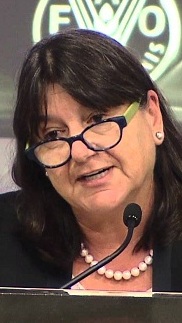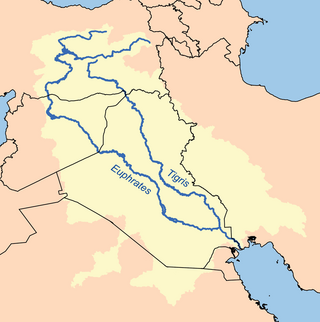
The Tigris is the eastern of the two great rivers that define Mesopotamia, the other being the Euphrates. The river flows south from the mountains of the Armenian Highlands through the Syrian and Arabian Deserts, before merging with the Euphrates and reaching to the Persian Gulf.

The Tigris–Euphrates river system is a large river system in Western Asia that flows into the Persian Gulf. Its primary rivers are the Tigris and Euphrates, along with smaller tributaries.

The United Nations Human Rights Council (UNHRC) is a United Nations body whose mission is to promote and protect human rights around the world. The Council has 47 members elected for staggered three-year terms on a regional group basis. The headquarters of the Council are at the United Nations Office at Geneva in Switzerland.
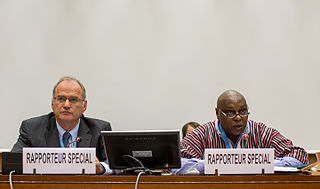
Special rapporteur is the title given to independent human rights experts whose expertise is called upon by the United Nations (UN) to report or advise on human rights from a thematic or country-specific perspective.
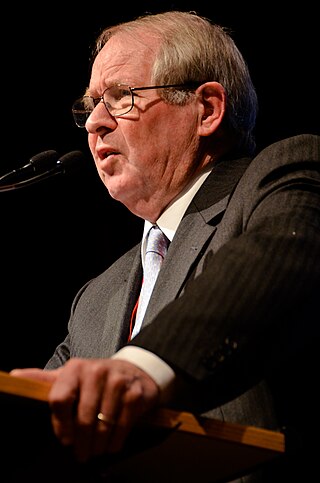
Christopher John Robert Dugard is a South African professor of international law. His main academic specializations are in Roman-Dutch law, public international law, jurisprudence, human rights, criminal procedure and international criminal law. He has served on the International Law Commission, the primary UN institution for the development of international law, and has been active in reporting on human-rights violations by Israel in the Palestinian territories.

Philip Geoffrey Alston is an Australian international law scholar and human rights practitioner. He is John Norton Pomeroy Professor of Law at New York University School of Law, and co-chair of the law school's Center for Human Rights and Global Justice. In human rights law, Alston has held a range of senior UN appointments for over two decades, including United Nations Special Rapporteur on extrajudicial, summary or arbitrary executions, a position he held from August 2004 to July 2010, and UN Special Rapporteur on extreme poverty and human rights from 2014-2020.

Richard Anderson Falk is an American professor emeritus of international law at Princeton University, and Euro-Mediterranean Human Rights Monitor's Chairman of the Board of Trustees. In 2004, he was listed as the author or coauthor of 20 books and the editor or coeditor of another 20 volumes. Falk has published extensively with multiple books written about international law and the United Nations.

Doru Romulus Costea is best known as President of the United Nations Human Rights Council. Costea served as president from 19 June 2007 to 18 June 2008. His main task was to initiate the Universal Periodic Review of the human rights records of the then 192 member states of the United Nations.
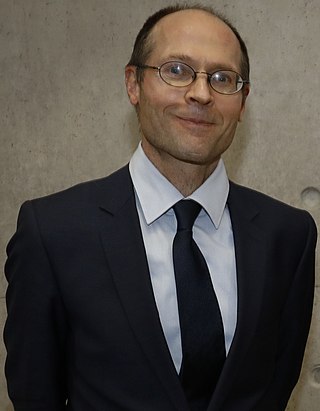
Olivier De Schutter is a Belgian legal scholar specialising in economic and social rights. He served as the United Nations Special Rapporteur on the right to food from 2008 to 2014. He is a Professor of international human rights law, European Union law and legal theory at the University of Louvain (UCLouvain) in Louvain-la-Neuve, Belgium, as well as at the College of Europe and at Sciences Po in Paris. He was a regular visiting professor at Columbia University between 2008 and 2012 and has regularly contributed to the American University Washington College of Law's Academy on Human Rights and Humanitarian Law. He is the first chair of the Belgian Advisory Council on Policy Coherence for Development and he co-chairs the International Panel of Experts on Sustainable Food Systems (IPES-Food), a group of experts from various disciplines and regions who work together towards developing proposals for food systems reform. A Member of the UN Committee on Economic, Social and Cultural Rights between 2015 and 2020, he was appointed the UN Special Rapporteur on extreme poverty and human rights, and took up his functions on May 1, 2020.
The Special Rapporteur on the Right to Food is a Special Rapporteur appointed by the United Nations, who reports on the right to food. The mandate was established in 2000 by the former Commission on Human Rights which appointed the first Rapporteur, Jean Ziegler. In 2008 the second Rapporteur, Olivier De Schutter, was appointed by the United Nations Human Rights Council, the successor to the Commission. In 2014 the third Rapporteur, Hilal Elver was appointed. In 2020, the current Rapporteur, Michael Fakhri, was appointed.

Maina Kiai is a Kenyan lawyer and human rights activist who formerly served as the United Nations Special Rapporteur on the rights to freedom of peaceful assembly and of association from May 1, 2011, to April 30, 2017. Between 2018 and 2024, he headed Human Rights Watch's Alliances and Partnerships program.

The United Nations special rapporteur on the rights to freedom of peaceful assembly and of association works independently to inform and advise the United Nations Human Rights Council. The special rapporteur examines, monitors, advises and publicly reports on the rights to freedom of peaceful assembly and of association worldwide.

Agnès Callamard is a French human rights activist who is the Secretary General of Amnesty International. She was previously the Special Rapporteur on extrajudicial, summary, or arbitrary executions appointed by the United Nations Human Rights Council, and the former Director of the Columbia University Global Freedom of Expression project.

Miloon Kothari is a scholar and activist who served from 2000 to 2008 as the United Nations Special Rapporteur on adequate housing with the Human Rights Council. From 2015 to 2022, he was the President of UPR Info. He was convener of the Working Group on Human Rights in India and the UN (WGHR) from 2009 to 2014, an Indian human rights coalition that notably focuses on the Universal Periodic Review. He is the founder of the Delhi-based Housing and Land Rights Network (HLRN), which aims to work toward the "realization of the human rights to adequate housing and land." He currently serves as a member of the UN Commission of Inquiry on the Occupied Palestinian Territory, including East Jerusalem, and Israel.
Euro-Mediterranean Human Rights Monitor is an independent, nonprofit organization for the protection of human rights.
Stanley Michael Lynk is a Canadian legal academic. He is currently an associate professor at the University of Western Ontario. From 2016 to 2022 he was the Special Rapporteur on the situation of human rights in the Palestinian Territories occupied since 1967.
E. Tendayi Achiume is a Professor of Law and former Faculty Director of the Promise Institute for Human Rights at the University of California, Los Angeles. She served as the United Nations special rapporteur on Racism, Racial Discrimination, Xenophobia and Related Intolerance from her appointment in September 2017 until November 2022. She was the first woman appointed to this position since its creation in 1993.
Annalisa Ciampi is an Italian law professor and public official. In 2017, Ciampi served as United Nations Special Rapporteur on the Rights to Freedom of Peaceful Assembly and of Association.
Clément Nyaletsossi Voule is a Togolese diplomat and jurist. Voule served as the United Nations Special Rapporteur on the Rights to Freedom of Peaceful Assembly and of Association from 2018 to 2024. Prior to this, Voule served as African Advocacy Director International Service for Human Rights (ISHR).
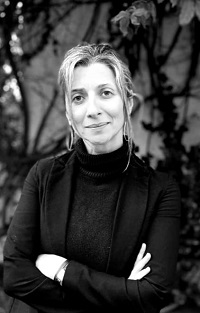
Francesca P. Albanese is an Italian international lawyer and academic. On 1 May 2022, she was appointed United Nations Special Rapporteur on the occupied Palestinian territories for a three-year term. She is the first woman to hold the position.
